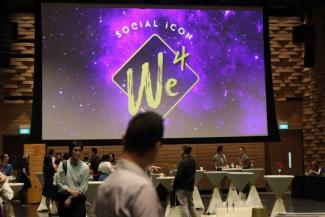
The third edition of Social iCon, a biennial social innovation conference hosted by the Singapore Management University, returned on 18 May 2018. Themed We⁴, the conference shone a spotlight on women and innovations in education, employment, environment and economic inclusion.
The event brought together a diversity of practitioners, policymakers, researchers and trailblazers from Southeast Asia. More than 200 participants from the SMU community and general public attended the forum, held at SMU’s School of Law, where they engaged with influencers and learnt about the opportunities and challenges faced by social entrepreneurs today.
Jonathan Chang, Executive Director of the Lien Centre for Social Innovation welcomed all participants with a heartfelt story of his own mother’s efforts to equip her children with an education, despite the odds she faced. Emphasising collaboration and the power of relationships in effecting social change, he reminded all that the roads to fight for equal access to education, for equal employment, for environmental sustainability and for financial inclusion, are often long and arduous. In such journeys, the commitment and dedication of social innovators across sectors is important.
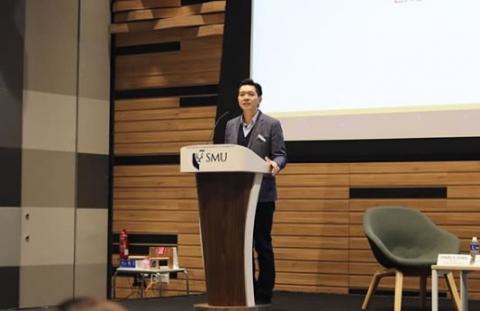
During the panel, Pamela Chng, founder of Bettr Barista Coffee Academy, shared her experiences as an entrepreneur over the past decade. To her, innovation should not necessarily be characterised by ideas that are radically different, or be about “moving fast” and “breaking things”. Instead, she defined innovation as moving methodically to create bite-sized solutions and the ability to put together seemingly disparate ideas to create positive social impact.
Case in point, she started Bettr Barista with hopes to use coffee as a tangible vehicle by which to holistically better the lives of women, youth-at-risk and the less privileged in communities all around the world. Wanting to harness the power of a business to effect sustainable change, she saw the coffee industry as a good opportunity to address all parts of the value chain. Bettr Barista was the first Certified B-Corp business as well as the President’s Challenge Social Enterprise of the Year 2017.
“Innovation should not be just for the sake of innovation, but to improve lives,” said Serey Chea, Assistant Governor at the National Bank of Cambodia in her presentation. Elaborating on blockchain technology as a potential way to improve the lives of her countrymen, she presented fresh perspectives on problems faced by women in terms of financial literacy and economic inclusion. Serey has been championing women’s economic empowerment through her involvement in the UNCDF Shift Program, serving as an AFI Committee Member on Gender and Women Financial Inclusion, and sitting on the Advisory Council of Women World Banking.
She also led the “Let’s Talk Money” campaign in Cambodia, which aims to promote financial literacy, particularly among women, and has paved the way for the successful incorporation of financial literacy in the general education program in Cambodia.
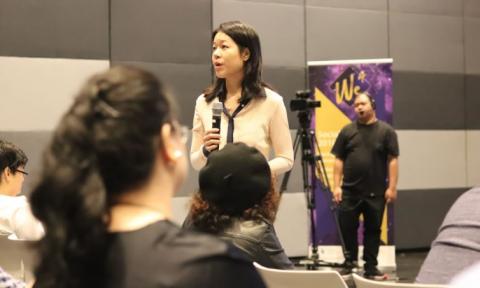
Vivian Claire Liew, founder of PhilanthropyWorks and an expert in climate change, offered insights to the topic of "Climate Change: Why Is Green the New Black?" Global warming is now affecting the production and prices of harvests from rice and chocolate to coffee and wines, which in turn affects survival and political stability within societies.
With climate change impacting not only lives, but the quality of life, she emphasised the need to understand it and to mitigate its effects instead of leaving it for future generations to deal with. Innovation could come in the form of replacing fossil fuels with renewables. Installing solar panels could save homeowners $60,000 over 25 years. At an individual level, one could actively think up solutions to change the world. Case in point, an American student invented a way to recycle Styrofoam, which normally takes 500 years to decompose.
Named the Young Global Leader 2015 by the World Economic Forum, Vivian leads PhilanthropyWorks in advising sovereign wealth funds about assessing climate impact on valuation, and governments and top philanthropists on achieving sustainable development goals, including the ASEAN Haze Crisis.
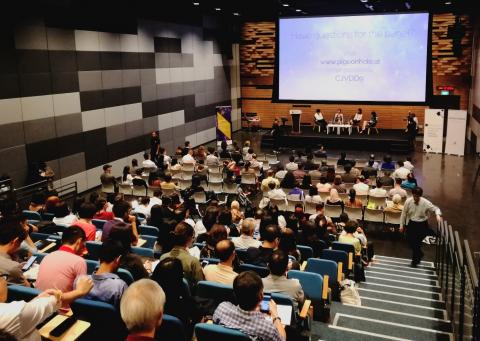
Following the presentations, Lin Suling, executive editor of Channel NewsAsia’s Commentary section, moderated a keynote panel discussion aimed at shedding light on social issues facing the Asia-Pacific. Asked to comment on what could be done in terms of greater private public partnerships for social good, panellists highlighted the importance of empathy and compromise and quoted Roussean philosophy of the social contract theory as a foundation to build upon. A consistent view held by panellists towards creating effective partnerships was the importance of truly listening to what each party wanted to achieve and the ability to find common ground before expertise to tackle topics like financial inclusion could bear fruit.
In regards to advice for those looking to venture into the social space, Pamela cautioned against being in a hurry to start a social enterprise, advising individuals to first accumulate experience working with government bodies, private organisations and NGOs. Serey spoke about inspiration and her personal experience coming across a woman entrepreneur in a rural province, who succeeded in sending her children to school. Vivian urged individuals to look at the key problems in the world that they most cared about, and how their unique skills sets might be able to address such issues. In closing the discussion, Suling thanked panellists for sharing the motivations driving their personal journeys towards creating social impact.
To facilitate open dialogue and exchange of ideas, the afternoon programme was organised in the form of four breakout sessions. Each breakout session was focused on the conference’s key themes of education, environment, employment, and economic inclusion and fielded by three expert panellists.
Panellists kickstarted the conversations by sharing their experiences and insights on the problems faced and progress made in terms of access to education, closing the gender gap, environmental preservation and building inclusive economies in Southeast Asia today.
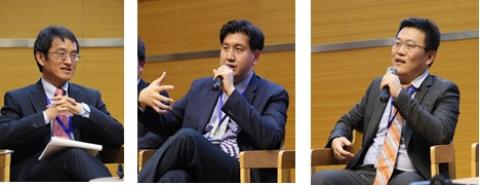
In line with Social iCon’s commitment to celebrating and furthering social innovation, participants also had the opportunity to learn more about social impact projects and enterprises exhibited at the event. This included Mother and Child Project (MnCP), a social enterprise which provides retail training and home-based sewing work to underprivileged women, single mothers, and women recovering from psychiatric conditions; as well as The SmartBFA (Smart Accessibility & Mobility for Barrier-free Access) project, which aims to find barrier-free access routes for Singaporeans, through the use of passively-crowdsourced sensor data.
Social iCon is a flagship conference organised by SMU’s Lien Centre for Social Innovation with the objective of catalysing the exchange of ideas and impactful solutions to social issues. Comprising keynotes, exhibitions and conversations, this year’s conference tackled the challenges in education, employment, environment and economic inclusion with the overarching aim of creating an equitable and sustainable future for all.
[Featured Photo: SMU welcomed more than 200 participants for its biennial Social Innovation Conference.]